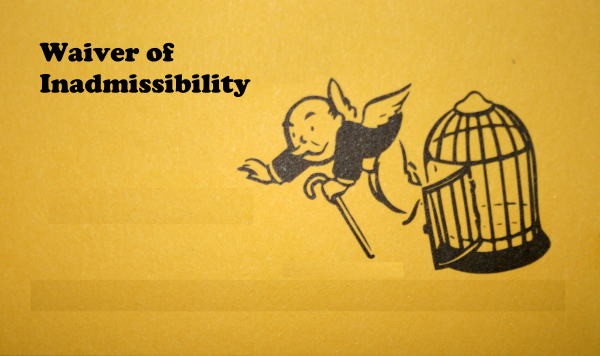If a consular officer denies a visa application, there is no appeal. Still, there may be several ways to challenge a visa denial, such as requesting reconsideration, supervisorial review, or an advisory opinion, or resubmitting the application.
If a visa denial cannot be overcome, it may be possible to request a “waiver.” A waiver is somewhat analogous to a pardon in criminal law, in that a waiver forgives an ineligibility, allowing visa issuance.
Contents
- Fraud or Misrepresentation Waiver – INA 212(i)
- Unlawful Presence Waiver – INA 212(a)(9)(B)(v)
- Crimes Involving Moral Turpitude Waiver – INA 212(h)
- Waiver for Multiple Criminal Convictions; Prostitution; or Possession of Marijuana – INA 212(h)
- Nonimmigrant Visa Waiver – INA 212(d)(3)
- Permission to Reapply after Prior Removal or Deportation – INA 212(a)(9)(A)
Fraud or Misrepresentation Waiver – INA 212(i)
The situations making an applicant ineligible for a visa, called visa ineligibilities or “grounds of inadmissibility,” are described in the Immigration and Nationality Act (INA).
A person who used fraud or committed a material misrepresentation in procuring or attempting to procure an immigration benefit is permanently inadmissible. INA 212(a)(6)(C)(i). However, a waiver is available under INA 212(i).
The requirements for a waiver are:
1. Be the spouse or son or daughter of a U.S. citizen or lawful permanent resident; and
2. Demonstrate that refusal of admission would result in extreme hardship to the qualifying relative.
Unlawful Presence Waiver – INA 212(a)(9)(B)(v)
A person who has been unlawfully present in the U.S. for more than 180 days but less than one year is inadmissible for three years. A person unlawfully present for one year or more is inadmissible for ten years. This bar is commonly referred to as the 3/10 year bar. However, a waiver is available under INA 212(a)(9)(B)(v).
The requirements for a waiver are:
1. Be the spouse or son or daughter of a U.S. citizen or lawful permanent resident; and
2. Demonstrate that refusal of admission would result in extreme hardship to the qualifying relative.
Crimes Involving Moral Turpitude Waiver – INA 212(h)
A person who has committed a crime involving moral turpitude is permanently inadmissible, with certain exceptions. However, a waiver is available under INA 212(h).
The requirements for a waiver are:
1. Be the spouse, son or daughter, or parent of a U.S. citizen or lawful permanent resident; and
2. Demonstrate that refusal of admission would result in extreme hardship to the qualifying relative.
or
1. The criminal activity occurred more than 15 years before the application for admission;
2. Admission would not be contrary to national welfare, safety, or security; and
3. The applicant has been rehabilitated.
Waiver for Multiple Criminal Convictions; Prostitution; or Possession of Marijuana – INA 212(h)
A waiver under INA 212(h) is available for a person inadmissible on the basis of (a) having committed two or more offenses for which the aggregate sentences to confinement were more than 5 years. INA 212(a)(2)(B); (b) having been involved in prostitution, or other commercialized vices. INA 212(a)(2)(D); or (c) having been convicted of the offense of possession of less than 30 grams of marijuana. INA 212(a)(2)(A)(i)(II).
The requirements for a waiver under are:
1. Be the spouse, son or daughter, or parent of a U.S. citizen or lawful permanent resident; and
2. Demonstrate that refusal of admission would result in extreme hardship to the qualifying relative.
or
1. The criminal activity occurred more than 15 years before the application for admission;
2. Admission would not be contrary to national welfare, safety, or security; and
3. The applicant has been rehabilitated.
or
1. The applicant is inadmissible only for engaging in prostitution;
2. Admission would not be contrary to national welfare; and
3. The applicant has been rehabilitated.
Nonimmigrant Visa Waiver – INA 212(d)(3)
An applicant for a nonimmigrant visa who is found inadmissible may qualify for a waiver under INA 212(d)(3). The applicant must demonstrate that the consulate officer should exercise favorable discretion. There are no prerequisites for this waiver or requirements to demonstrate hardship to a qualifying family member. Key discretionary factors include the seriousness and recency of the circumstances that led to inadmissibility, rehabilitation, and the purpose of travel to the U.S.
This waiver is not available for inadmissibility under INA 212(a)(2)(C) relating to drug trafficking; INA 212(a)(3)(A) relating to security grounds; INA 212(a)(3)(B) relating to terrorist activities; INA 212(a)(3)(C).
Permission to Reapply after Prior Removal or Deportation – INA 212(a)(9)(A)
A person who was removed through summary exclusion proceedings or through removal proceedings initiated upon the person’s arrival in the U.S. is inadmissible for five years. INA 212(a)(9)(A)(i). A person who is ordered removed after a deportation hearing or who departs the U.S. while an order of removal was outstanding is inadmissible for ten years. INA 212(a)(9)(A)(ii). A person who is removed two or more times, or who is removed after conviction of an aggravated felony is inadmissible for twenty years. INA 212(a)(9)(A)(ii). However, a waiver is available under INA 212(a)(9)(A).
Note: A person subject to inadmissibility under INA 212(a)(9)(C) may not apply for a permission to reapply until after ten years have passed.
The requirement for a waiver under is that the applicant must demonstrate that USCIS should exercise favorable discretion.
There are no requirements such as demonstrating extreme hardship to qualifying relatives. Factors to be considered in exercise of discretion include: the basis for deportation; recency of deportation; family ties in the U.S.; hardship to relatives; hardship to the applicant; and reformation or rehabilitation.

Leave a Reply